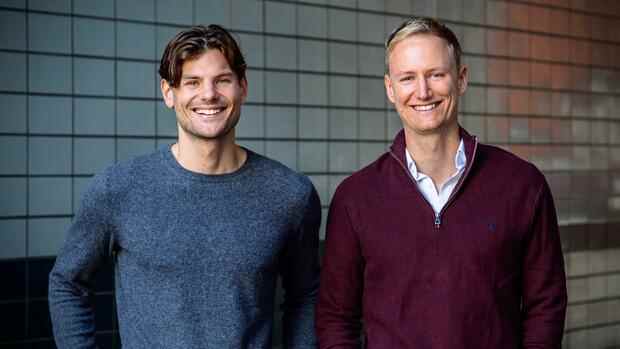Dusseldorf It is a flaming appeal that Wladimir Klitschko is addressing to the world. “Act now,” he calls out to viewers of the video that the former boxing star shared on his Instagram account. The brother of Kiev Mayor Vitaly Kitschko urgently calls on the world public to stand up for Ukraine, which has been attacked by Russia.
Via a link in his Instagram bio, he directs to a landing page that not only contains the video, but also numerous links to aid organizations and fundraisers. This page was created with the Creator software from the German start-up Zezam.
Zezam founder Niklas Schwake is pleased that he can support aid for Ukraine with the software he and his co-founder Jürgen Burkhart have developed. “We have employees in Belarus and Russia, which is why the war is affecting us personally,” says the 32-year-old. Together with their friend, the start-up Chefslist, they organize an aid transport to the Ukraine themselves.
Tatjana Kiel, the CEO of Wladimir Klitschko’s company Klitschko Ventures, asked him if he could support her in generating more reach for the calls for help, reports Schwake. With the help of Zezam’s software, Klitschko’s landing page can now be easily shared and linked across platforms, allowing it to reach significantly more people.
Top jobs of the day
Find the best jobs now and
be notified by email.
The story of Zezam 2019 began with a failure. Schwake and Burkhart, who had previously co-founded start-ups for Rocket Internet, wanted to set up their own platform that would provide body and mind coaches at affordable prices.
They wanted to provide non-licensed but certified coaches who offer private lessons from as little as 7.50 euros instead of the usual more than 100 euros. Schwake was so convinced of the idea that he even gave up his job at venture capital investor Earlybird for it.
Almost slipped into bankruptcy due to the pandemic
But the corona pandemic almost drove the founders into bankruptcy, as it practically brought the coaches’ business to a standstill – and with it Zezam’s business model. They reoriented themselves and developed a so-called creator software that makes it easier for influencers to conduct their business entirely via social media – without a classic website.
The volume of this so-called creator economy, i.e. the marketing of content via social media, is gigantic. Studies estimate it at 100 billion US dollars. Around 50 million people worldwide, influencers, bloggers, youtubers, are said to call themselves creators. But only a fraction of them can make a living from this activity.
Zezam’s software, which has been optimized for mobile use, should give them the opportunity to bundle all their products and services in one place with little effort and put them in their Twitter, Instagram, Tiktok or LinkedIn bio via a link. “This cross-platform linking leverages their reach enormously,” promises Schwake, who was included in Forbes’ 30 under 30 list in 2018.
>> Read here: What influencers earn – and what they have to pay taxes on.
The basic version, which Wladimir Klitschko also uses, is free. The premium version, which offers additional functions for the commercialization of content and services, costs eight euros per month plus three percent commission on sales.
The PayPal payment service can then also be integrated. Creators can use the platform to offer live events and video courses, sell products or collect donations. In a next step, the much-used shop system Shopify is to be integrated to make e-commerce even easier.
Prominent investors convinced of the business model
Numerous prominent investors apparently see good potential in Zezam and have recently made a further 2.1 million euros available to the company. Among them are Hellofresh founder Dominik Richter, Burda Media CEO Bernhard Kallen, Kapten & Son founder Artjem Weissbeck and On Running founder Olivier Bernhard.
“I’ve rarely seen a team that has so much stamina,” says investor Weissbeck. “The rapid growth today shows that they are finally being rewarded for it.” The creator economy, which Zezam is targeting, is a megatrend and a huge market. Creators were now starting to monetize their built reach and needed the right software to do so.
In any case, the demand for the software in the community seems to be high. “Just 2 months after opening the platform to all creators, we have reached a reach of more than 100 million followers,” reports Zezam founder Schwake. They now have four to five times as much traffic from the USA as from Germany.
It is used, for example, by fitness trainer Victoria D’Ariano, who sells courses to her 760,000 followers via Instagram. The Berlin gallery owner Johann König, who has more than 100,000 followers on Instagram, also uses it to present and sell his content. And companies are also recognizing the potential: The Fitness First gym chain, for example, has launched its own platform based on Zezam technology, which personal trainers can use to offer and bill for digital training.
More: When soldiers film from the tank: Tiktok becomes a war channel
